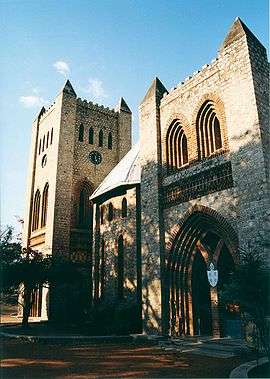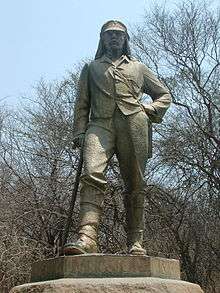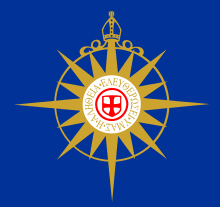Church of the Province of Central Africa
| The Church of the Province of Central Africa | |
|---|---|
| Primate | Albert Chama |
| Headquarters | Mzuzu |
| Territory | Botswana, Malawi, Zambia and Zimbabwe |
| Members | 600,000 |
| Website | www.anglicancommunion.org |
The Church of the Province of Central Africa is part of the Anglican Communion, and includes 15 dioceses in Botswana, Malawi, Zambia and Zimbabwe. The Primate of the Church is the Archbishop of Central Africa. Albert Chama is the current Archbishop, being installed on 20 March 2011, succeeding Bernard Amos Malango who retired in 2007. From 1980 to 2000, Walter Khotso Makhulu, a noted Anti-Apartheid activist, was Archbishop as well as Bishop of Botswana. Archbishop Chama continues to serve as Bishop of Northern Zambia, and is the second Zambian to be Archbishop of Central Africa.[1]
History

In 1861, the first Anglican missionary to the area was Bishop Charles Frederick Mackenzie, who arrived with David Livingstone. In 1855, he went to Natal with Bishop John Colenso. They worked among the English settlers till 1859. In 1860, Mackenzie became head of the Universities' Mission to Central Africa and he was consecrated bishop in St George's Cathedral, Cape Town, on 1 January 1861. Following Dr David Livingstone's request to Cambridge, Bishop Mackenzie took on the position of being the first missionary bishop in Malawi (Nyasaland).
Moving from Cape Town, he arrived at Chibisa’s village in June 1861 with the goal to establish a mission station at Magomero, near Zomba. Bishop Mackenzie worked among the people of the Manganja country until January 1862 when he went on a supplies trip together with a few members of his party. The boat they were travelling on, sank and as medical supplies were lost, Bishop Mackenzie’s malaria could not be treated. He died of Blackwater fever on 31 January 1862.
There is an International school named after Mackenzie, which teaches children from 4 to 17 and is found in Lilongwe the capital of Malawi. The independent Church of the Province of Central Africa was inaugurated in 1955 and has a movable primacy.
Membership
Today, there are at least 600,000 Anglicans out of an estimated population of 31,780,000.
Structure

The polity of the Church of the Province of Central Africa is Episcopalian church governance, which is the same as other Anglican churches. The church maintains a system of geographical parishes organized into dioceses. There are 15 of these, each headed by a bishop. The Primate and Metropolitan is the Archbishop of Central Africa.
- The Diocese of Botswana[2]
- The Diocese of Central Zambia
- The Diocese of Central Zimbabwe
- The Diocese of Eastern Zambia
- The Diocese of Harare
- The Diocese of Lake Malawi
- The Diocese of Luapula
- The Diocese of Lusaka
- The Diocese of Manicaland
- The Diocese of Masvingo
- The Diocese of Matabeleland
- The Diocese of Northern Malawi
- The Diocese of Northern Zambia
- The Diocese of Southern Malawi
- The Diocese of Southern Malawi-Upper Shire
There are 250 congregations and about 400 priests in the Church of the Province of Central Africa.
Doctrine and practice
The centre of the Church of the Province of Central Africa teaching is the life and resurrection of Jesus Christ. The basic teachings of the church, or catechism, include:
- Jesus Christ is fully human and fully God. He died and was resurrected from the dead.
- Jesus provides the way of eternal life for those who believe.
- The Old and New Testaments of the Bible were written by people "under the inspiration of the Holy Spirit". The Apocrypha are additional books that are used in Christian worship, but not for the formation of doctrine.
- The two great and necessary sacraments are Holy Baptism and Holy Eucharist
- Other sacramental rites are confirmation, ordination, marriage, reconciliation of a penitent, and unction.
- Belief in heaven, hell, and Jesus's return in glory.
The threefold sources of authority in Anglicanism are scripture, tradition, and reason. These three sources uphold and critique each other in a dynamic way. This balance of scripture, tradition and reason is traced to the work of Richard Hooker, a sixteenth-century apologist. In Hooker's model, scripture is the primary means of arriving at doctrine and things stated plainly in scripture are accepted as true. Issues that are ambiguous are determined by tradition, which is checked by reason.[3]
Ministry, liturgy and ecumenical relations
The Church of the Province of Central Africa embraces three orders of ministry: deacon, priest, and bishop. The Church of the Province of Central Africa does not ordain women. Local variants of the Book of Common Prayer are used in worship. Like many other Anglican churches, it is also a member of the ecumenical World Council of Churches.[4]
Anglican realignment
The Church of the Province of Central Africa is a member of the Global South. Former Archbishop Bernard Malango was involved in the Anglican realignment, while current Archbishop Albert Chama, despite having attended the Global South Fourth Encounter held in Singapore, on 19-23 April 2010, has been a supporter of "reconciliation" between the conservative Anglican provinces and the liberal provinces of North America. The Dioceses of Northern Malawi and Southern Malawi-Upper Shire are "mission partners" of the Anglican Mission in the Americas.[5]
See also
References
- ↑ Anglican Communion News Service: Zambian bishop installed as sixth Archbishop of Central Africa Province
- ↑ The Rt Revd Trevor Mwamba, Bishop of Botswana, is portrayed in The No. 1 Ladies' Detective Agency books by Alexander McCall Smith and appears as himself in the TV series.
- ↑ Anglican Listening Detail on how scripture, tradition, and reason work to "uphold and critique each other in a dynamic way".
- ↑ World Council of Churches
- ↑ Anglican Mission in the Americas Official Website
Further reading
- Neill, Stephen, Anglicanism. Harmondsworth: Penguin, 1965.
